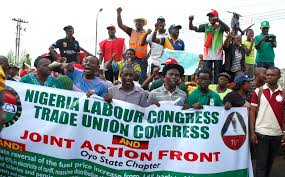By Akanimo Sampson
Labour does not seem to be ready to shift ground on their insistence for the 36 governors of the federation to pay their workers the disturbing N30,000 minimum wage. For the insisting labour leaders, it is either the governors pay or brace to face the wrath of the workers.
The Joint Public Service Negotiating Council (JPSNC) wants the governors to commence immediate payment of the new minimum wage of N30,000 with effect from April 18. This implies that the governors are already owing their workers more than six months arrears of the new pay.
The Council which has negotiated the consequential adjustments arising from the new minimum wage with the Federal Government said on Tuesday that it had written to the state governments on the issue and directed the representatives of the workers’ unions to commence the negotiations.
Secretary of the JNPSNC, Alade Lawal, who said a draft of the letter to be sent to state governments was ready, argued that although labour was yet to receive a circular from Abuja through the National Salaries, Incomes and Wages Commission, “the council has improvised a replica suitable for the state councils to work within their negotiations.’’
According to him, “negotiations with state governments start anytime from today. We have agreed that the joint national negotiating council should send letters to state governments which will be sent Thursday. The draft for the letter is ready. We will first send it to our members’ email addresses in the states and then send the hard copy to the state governments. Negotiations start immediately after the receipt of the letter.’’
Continuing, he said the agreement with the central government was the minimum that all state negotiations must achieve, stressing that in some states where pay package is poor, percentage increase will be higher than what was agreed with Abuja.
“We are hopeful that by December 31, all negotiations should be wrapped up. In areas where we have difficulties, we have decided to move in as a group to shut down the state towards ensuring that implementation is done. The agreement we had with the FG is the minimum for the states. Some will go beyond it but no one will go below it,’’ Alade Lawal said.
In the mean time, the JNPSNC has given some major documents to the state councils that will guide them, with this coming December 31, set for completion of all negotiations.
Chairman of the JNPSNC, Simon Anchaver, says the meeting with state councils is important because labour is eager to start negotiations with state governments, pointing out that any governor that acts against the wish of workers on the new wage structure implementation deserves to be impeached.
He said that it will not be difficult for the state governments to constitute negotiating committee since all members were principal government officers statutorily qualified to be on board. ‘’We have enough resources in this country to cater for our welfare. You are aware that labour creates wealth and we will not allow politicians to distribute the wealth (among themselves alone). It must also be distributed to people that voted them into power.
“On the issue of timeline, we expect that all negotiations must be completed by the end of the last quarter of this year. If a governor is able to pay within one month, we will have no problem with that.
Implementation must take effect from April 18, 2019 when the New Minimum Wage Bill was signed by President Muhammadu Buhari.
“There are three documents handed over to the state negotiating council chairmen. The first one is the agreement we signed with the Federal Government on the consequential adjustments. We are expecting a circular (new wage structure table) from the National Salaries, Incomes and Wages Commission but we are being proactive. We have decided to develop a table on consolidated public salary structure and the consolidated health sector salary arrangement.
“This is like a replica of the table that we are expecting from the NISWC based on the agreement that we signed with the FG on October 18, 2019. This was given to state negotiating council chairmen to serve as guide so that they can have a view of what it looks like when they start their own negotiations,’’ he said.

